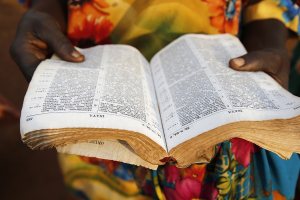2016 'Evangelical Primary' Is Already In Motion

Now that the mid-term elections are over, the political class is pivoting its attention to 2016. Most Americans aren't yet focused on electing our next president, but make no mistake: the potential candidates are already heavily engaged in running for that job.
One sign of the early activity is that the "Evangelical Primary" is already in full swing. According to network exit polls in 2012, self-identified evangelical Christians comprised 51 percent of all the votes cast in Republican presidential preference primaries and caucuses. So no one seeking the GOP nomination in 2016 can afford to ignore this vital and dynamic constituency. There is simply no viable road to the presidency for a Republican candidate who fails to win strong support from voters of faith.
The 2014-midterm elections confirmed the persistent and enduring potency of the evangelical constituency in American politics. According to a post-election survey by Public Opinion Strategies, Christian conservatives and Evangelicals comprised 32 percent of the electorate, voting 86 percent Republican and 12 percent for Democratic candidates. They were the largest and most vibrant single voting bloc in the midterm electorate, larger than the African-American vote, Hispanic vote, union vote, and "gay" vote combined.
For that reason, Republicans eyeing the White House are actively courting Evangelical Christian leaders and grassroots activists and have been for months. They know Evangelicals dominate the vote in early caucus and primary states like Iowa and South Carolina. Thus, a candidate in 2016 that can win over and hold the trust and enthusiastic support of the bulk of Evangelicals would likely win those states, and much of the South and Midwest, and have a clear shot at the Republican nomination.
Evangelicals, therefore, must choose wisely. We have a unique opportunity to help preserve our nation's liberty and prosperity for future generations by choosing the right nominee and turning out en masse at the polls. But who and what are we looking for exactly? Space does not permit a comprehensive list here, but we believe it is important right up front to set forth some basic principles that should guide our selection process.
It has been said that a great leader, in addition to having solid moral character and being above reproach, has two essential tools: a compass, and a magnet. We wholeheartedly agree.
Great leaders have a clear sense of direction. They know where to go, and they are going to the right place. They understand the enormous challenges that lie ahead. They also have both a broad vision and a carefully thought-through plan to achieve it.
Yet great leaders do not merely have a compass. They also have a magnet, a winsome capacity to draw people onto their team, persuade them to follow, and inspire them to play their part in implementing the plan. Such leaders can connect with factory workers and business owners, with young people and seniors, singles, couples and parents, people of faith and those for whom faith is not a central part of their lives. Indeed, we would argue that this intangible quality of empathy and the ability to connect with voters is essential not only to winning elections, but to governing. It's not enough to have thoughtful positions on key issues if the majority of voters don't believe you care for them and have their best interests at heart.
Now more than ever, our ship of state needs a great leader at the helm who has the wisdom, experience, and deep personal resolve to steer our nation back to greatness.
A recent CBS News poll found 65 percent of Americans believe the U.S. is on the wrong track. A mere 29 percent believe we are on the right track. The reasons are clear enough. At home, Americans see millions unemployed or underemployed. They see stagnant wages, factories closing, and jobs moving overseas. They see families disintegrating, a plague of violent crime and drugs, a relentless assault against faith and traditional values, a $17 trillion-plus national debt that is rapidly climbing with no apparent end in sight, and a culture of scandal, ineptitude, and incompetence in Washington. No wonder average Americans feel abandoned and exasperated.
Abroad, Americans see respect for our country evaporating. Our enemies don't fear us. Our friends don't trust us. Americans are deeply concerned about the rising threats from Russia, China and Radical Islam, as well as a porous — and dangerous — southern border. With a shrinking military and a weak and indecisive president in the White House, Americans see our enemies moving aggressively into a vacuum of Washington's own making, putting our own security and that of our friends and allies in grave danger. And if this were not enough, they fear the future of their children will not be nearly as bright as it was for them.
There is no question that America is in a state of decline. But the situation is actually more serious than that. The United States faces outright collapse if we do not soon make fundamental and serious changes at home and abroad.
There are several reasons, but consider just one: our fiscal situation. As 80 million-plus Baby Boomers begin to retire, we face upwards of $55 trillion in unfunded entitlement liabilities on top of the nearly $20 trillion national debt. When it comes to Social Security, Medicare, and Medicaid, the politicians in Washington have made the American people promises regarding retirement income and benefits they simply do not have the money to pay for unless they impose massive tax increases and borrow unprecedented amounts of money from foreign governments. Yet such actions would destroy jobs, suffocate our economy, and undermine our national sovereignty. And when those bills come due, how will we also pay for a strong American military or maintain any of the federal government's other essential services?
That said, most Evangelicals understand that not all of our daunting challenges can — or should — be solved by Washington. Some important matters need to be handled at the state and local level. Others can best be solved by businesses, churches, families, and other civic institutions.
Above all, America needs the help of Divine Providence. We have faced enormously difficult times in the past. Yet, by the grace of Almighty God, we have also seen Great Awakenings in American history. The first game-changing series of spiritual revivals occurred in the U.S. in the 1700s. Another took place in the 1800s. During these eras, Americans who had been drifting from spiritual matters and thus seeing increases in alcoholism, crime, and other social troubles, suddenly turned back to a deep faith in Jesus Christ and returned to church in massive numbers. They once again became passionate about raising healthy families, educating their children, caring for the needy and vulnerable among them, and building strong, vibrant, healthy communities without an over-dependence on government. They realized afresh that a self-governing society needs to be made up of self-governing individuals and families. And in the wake of these Great Awakenings came the greatest era of business entrepreneurship, technological innovation, economic growth, social reform, military might, and religious devotion the world has ever seen.
Today, we need a new Great Awakening. To truly get America back on the right course, we urgently need to humble ourselves and pray — faithfully and consistently — for God to give our country a series of spiritual, social and sweeping national revivals that will truly transform individuals, families and our culture. The challenges we face as a nation are simply too great to be solved by our own efforts. We need God's help.
In the meantime, we must faithfully do our part. There are vital matters that leaders in Washington — and particularly the American president — are uniquely called upon to handle in our constitutional form of government. Thus, the process of choosing our next leaders is all the more important, and we must approach the process with the utmost care and sobriety.
For one thing, given such high stakes, we cannot afford another inexperienced, untested president. We simply do not have the luxury of choosing someone who gives great speeches but has little or no record of solid leadership and proven results.
Rather, at this moment in history, we need a president with broad national and international experience, a leader who:
Truly understands and can explain the increasingly precarious position in which America finds itself;
- Will lay out a bold but realistic set of reforms at the federal level to lead American renewal at home and abroad;
- Will focus Washington like a laser on the urgent priorities for which the federal government has clear Constitutional authority, and entrust the rest to the States and the American people in keeping with the 10th Amendment;
- Will set aside petty partisanship and politics-as-usual sniping and bring the people, Congress, and the States together behind honest, principled, commonsense solutions;
- Can inspire and encourage the American people through the long and challenging process of reform, and simultaneously rebuild trust with our friends and allies around the world;
- Truly understands that America was built with the help of Divine Providence, needs God's help to rebuild and revive this "shining city on a hill," and will not be afraid to speak to the importance of religious faith and freedom in the history of the American Experiment.
Specifically, Evangelicals will be evaluating each candidate for president on at least seven critical sets of issues:
1. LIFE — What position does the candidate hold on the issue of protecting innocent human life, in the area of abortion as well as euthanasia, physician-assisted suicide, and the rationing of care to the elderly, disabled, and infirm? Does he or she agree with the signers of the Declaration that the right to life comes before the right to liberty, and that these rights are endowed to us by our Creator, not by the state? Does he or she have proven, consistent experience championing the rights of the unborn? And will he or she continue to champion a culture that respects the sanctity of innocent human life, from conception to natural death?




























